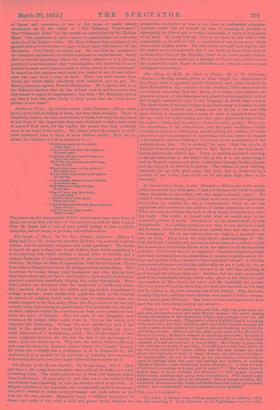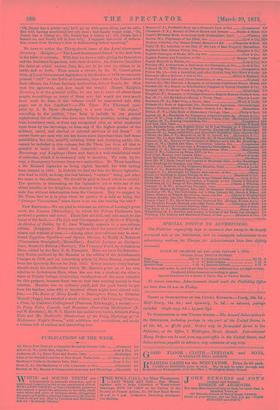As Innocent as a Baby. 3 vols. (Bentley.)—This is one
of the novels which we should like to disroiss, if such a criticism were likely to satisfy either the public or the author, with the simple comment "good." We found it very entertaining, never halted as we read, and were positively sorry when we reached the end, a commendation which no one can appreciate who cannot see our shelves of books clamorous for review. When we come to criticise the book at all in detail, we cannot help find- ing fault. The writer is cynical with what we would hope is the assumed cynicism of youth. Assumed or no, the characteristic is very disagreeable. It is neither courteous nor true to say that ladies read the decisions of the Divorce Court more eagerly than any other part of the newspaper. We do not believe that one lady in a hundred ever looks at them. Then there are very stupid apostrophisings of " Mr- Puff, the Critic ;"and after all, our author has to descend to a device which the veriest tyro in criticism knows to be the stalest in all the repertory of fiction. Two lovers have to be separated. Could not something better have been invented than the absurdities of making a gentleman of for- tune and position bribe a servant to intercept their letters ? Is this the unexpected denouement which the author tells we are to look out for, or is it a slap in the face for readers, who are to be told that anything is
good enough for such as they are Another, but far more pardonable fault is the remarkable change which takes place in the character and conversation of Mrs. Level, the aunt, and Mr. Lockfleld, the parson.
They are prosy old people when they are first introduced to us, but they end by talking in the most amusing and lively fashion. This, however, is easily forgiven; and the same criticism was passed, it will be remem- bered, on the great Pickwick. Mrs. Level on love and matrimony is so good that we cannot help making one extract :— " What is love ? Two people meet and look, sigh and grow pale, the girl puts her needle away, and buys Moore's poems ; the youth makes wrong calculations in his employer's ledger, and perhaps robs the till to make the girl presents. They marry, after a frightful deal of wronging with each other and their families, after they have become scraggy for want of sleep, feeble-minded for want of rational thinking, and then the girl begins to fret. Richard isn't the same as he used to be ; Richard is often very cross; Richard's temper is anything but sweet ; Richard is out enjoying himself, while his wife sits at homo afflicted with the double calamity of a bad servant and a young baby. Her liberty is gone, she isn't allowed—properly, if you like; I would have a wife very strict—I say she isn't allowed to please others, and the only person she may please, her husband, is tired of being pleased; she becomes a drudge ; the nursery fills; she has no leisure to see her friends ; all her time is spent in looking after the cook and bathing the children, in reading 'Hints to Mothers,' and wondering where Richard is. Is that the sort of life you'd encourage a young girl to enter ? "—"But where there is money most of these troubles are obviated."—" Will money prevent babies from teething and going into convulsions ? Will money keep soldiers and policemen out of the kitchen ? Money brings troubles, Mr. Lockfield. It brings society, balls, and fiddles into your house, intoxicated waiters, and a melancholy misapprehension of your position."
This, too, is very good:— " The trick of Scotch song-writing appears to be in getting a first line and repeating it. If an Irishman or an Englishman were to -s ito, Oh, Jenny has a pretty eye,' he'd go on with more ideas, and be satis- fied with having mentioned her eye once ; but Sandy would write, Oh, Jeanie has a bonny ee ; Oh, Jeanie has a bonny ee; Oh, Jeanie has a bonnie ee, and Sandy fell in love wit' I suppose this trick of reitera- tion comes from Sawney's love of deliberating before speaking."



































 Previous page
Previous page